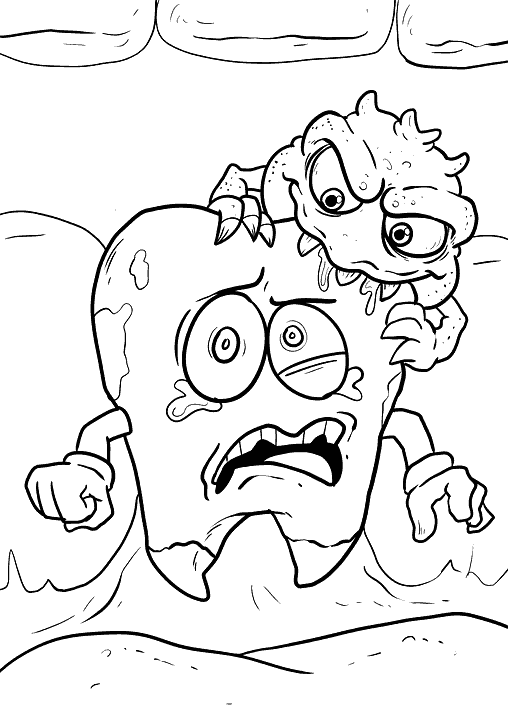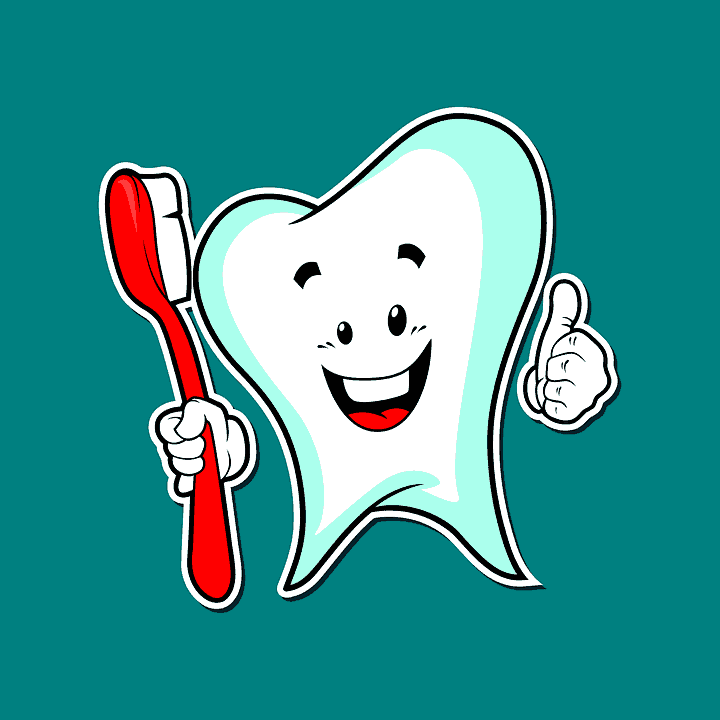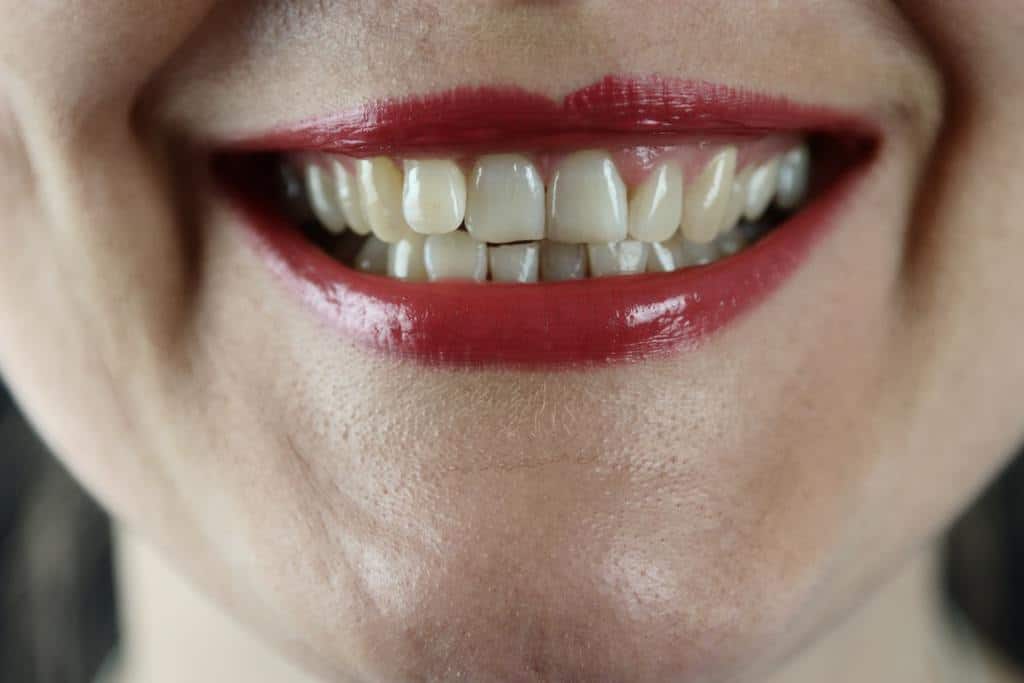We all know that brushing our teeth is something we need to do at least twice a day. What we’re usually not familiar with is the right technique for doing it properly and the possible health implications of not brushing our teeth regularly and in the right way. However, the consequences of poor oral hygiene go beyond bad breath and coffee-stained teeth and they can cause serious health issues such as tooth decay and loss, gingivitis, coronary artery disease, tooth abscesses, pneumonia, diabetes, dementia and complications during pregnancy. In order to prevent these health issues from happening, parents should teach their kids good oral hygiene as the awareness of the importance of teeth brushing develops from an early age.
Health implications
Tooth decay and loss

Most people brush teeth improperly and as a consequence, they can potentially experience tooth decay and tooth loss. How does this happen? Well, our mouth is full of bacteria, which can cause tooth decay if not regularly removed by brushing and flossing. People who tend to drink sodas in large amounts are especially in danger of tooth decay. This is because of the sugar film that sticks in their mouth. To assure healthy and pearly white teeth, experts suggest brushing your teeth at least twice a day, once in the morning and once in the evening, and if possible even after every meal.
Coronary artery disease
Another serious health issue irregular and improper brushing can cause are different kinds of gum diseases which can lead to coronary artery diseases consequently. This problem is thought to stem from the bacteria present in our mouth which eventually enter our bloodstream and cause problems. What happens next is that these bacteria attach to the plaque in our arteries, causing inflammation and possibility for developing clots and blockages that lead to heart attacks. Not many people are aware of the health issues not brushing their teeth regularly can cause.
Gingivitis and other gum diseases
Gum diseases such as gingivitis and others arise from the bacteria present in our mouth. Bacteria cause damage which is usually reflected in the whitish-yellowish substance that covers our teeth and gums. In order to prevent plaque from creating tartar buildup, you should learn to brush your teeth properly, do it regularly and go to regular dental checkups in certified dental clinics. Dental centers such as Penrith Dental Clinic are specialized in preventative, cosmetic and general dentistry, offering regular checkups, bad breath solutions, snoring and grinding solutions as well as procedures such as teeth whitening, dental crowns, bridges and dentures, among others. By regular visits to your dentist, you can avoid developing gingivitis or some other gum disease which can cause further health problems.
Complications in pregnancy
Recent research has found that mothers to be who have poor oral hygiene impose risks of preterm birth, low birth weight as well as higher risks of developing teeth cavities as far as their newborns are concerned. Scientists believe that this is due to bacteria coming from the mother’s mouth causing inflammation through their blood that reaches the baby via the placenta. So, to assure your kids avoid having bad teeth genetically, it’s a good idea to pay attention to your teeth hygiene even more during pregnancy.
Tooth abscesses
Another health issue caused by improper oral care is tooth abscesses. These are painful pockets full of germs and bacteria, where infections thrive. If you experience this issue, you should take care of it immediately as it can quickly become even more serious. If not treated promptly, these tooth abscesses can lead to brain abscesses, which can endanger your life. Hence, it’s definitely not something you want to gamble with. Oral care is of great importance for our overall health and wellbeing.
Pneumonia
Pneumonia is yet another serious problem an overgrowth of bacteria in your mouth can cause. This can happen as you can easily inhale these harmful bacteria into your lungs where they cause pneumonia. Recent findings show that an improvement in hospital patients’ oral health decreased the chances of them developing pneumonia by 40%.
Diabetes
People who suffer from diabetes are at a greater risk of developing different kinds of gum disease as poor oral care leads to increased risk of insulin-resistance and diabetes as it boosts inflammation. Another reason good enough to learn how to properly brush your teeth, how often to brush them, what toothpaste to use and what toothbrush is the best.
Dementia
A study that researched the connection between poor oral health and dementia found that people who had poor oral hygiene were at greater risk of developing dementia in the later stages of their life by 65%. The connection lies in the bacteria ending up in the brain through the cranial nerve connecting the jaw through the bloodstream.
Prevention

Teach your kids the habit of good oral hygiene
Good dental hygiene begins when kids are young. To be more precise, it should start in the infancy period. Parents should clean their baby’s gum with a clean, damp cloth in order to remove bacteria. This cleaning is essential as it makes them accustomed to cleaning their gums and eventually teeth. It makes the whole process of dental hygiene more familiar and closer to them. In this way, they will learn that brushing their teeth is something they should do at least twice a day and that it is something necessary as well as beneficial for them. It is the best way to make teeth brushing deeply rooted in their minds. Every child is different and ready for brushing its teeth by itself at a different age. To make the teeth brushing process more fun, make it a family activity. They can learn a lot about the proper way and technique by watching you brush your teeth. Allow them to pick out their own toothbrush and it wouldn’t be a bad idea to opt for a child-friendly tasting toothpaste.
Learn to brush your teeth properly
The aforementioned dental problems all stem from brushing your teeth improperly, not frequently enough, with a wrong toothbrush and toothpaste. In order to assure clean, crisp white, cavity-free teeth, fresh breath and disease-free mouth you should revise your brushing technique – the chances are you’re doing it wrong. Experts say that people brush their teeth in order to maintain fresh breath and to fulfill an expected social norm, without grasping the importance and possible health implications otherwise. When we brush and floss, our goal should be the prevention of tooth decay with crispy white teeth and minty breath as collaterals. Dentists suggest that the majority of people make the same mistakes.
Firstly, many people use too much water during and after brushing, which is bad as it dilutes fluoride found in the toothpaste. Second, many people brush either too hard, which damages the teeth and gums or too soft, which results in failure to remove all debris and plaque. Next, one of the most common mistakes people make is brushing from side to side rather than from top to bottom. Moreover, it often happens that people don’t brush their teeth long enough or often enough. Namely, you should brush your teeth at least twice a day, if possible after every meal and it should last about 2 minutes. Furthermore, people usually fail to brush all parts inside their mouths equally, particularly the inside surfaces nearest the tongue and toward the back of the mouth. And finally, the choice of toothbrush is important. The toothbrush that works for you should have the right type of bristles and it shouldn’t be too small or too big for your mouth. You should buy a new one once in three months.
Proper dental hygiene is of key essence not only for the health and looks of your teeth and gums but also for your overall health and by maintaining it properly you can avoid some serious health issues as seen.


